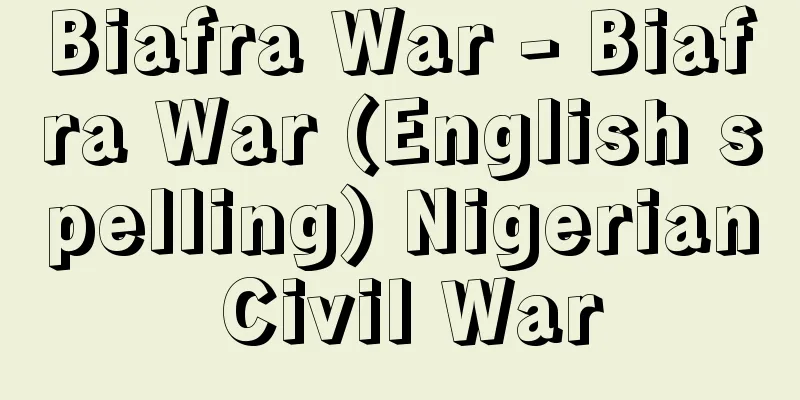Biafra War - Biafra War (English spelling) Nigerian Civil War

|
A war over the separation and independence of the Eastern Province of the Federal Republic of Nigeria. On May 30, 1967, the state unilaterally declared its separation and independence from the Nigerian Federation as the Republic of Biafra. On July 6 of the same year, federal government forces advanced into the Eastern Province, starting a civil war. After about two and a half years of fighting, on January 11, 1970, Biafra's temporary capital, Owerri, fell, and its leader, General C. Ojukwu (former military governor of the Eastern Province of the Federal Government), fled the country. On the 15th of the same month, General Y. Gowon, chairman of the Supreme Military Council of Nigeria (de facto head of state), declared the end of the civil war. During this time, about 2 million people died on the Biafran side, including those who died of starvation and war, and it attracted worldwide attention as a "tragedy rarely seen in human history." The main cause of this civil war was the tribal conflict between the Igbo people in the east and the Hausa people in the north, which was caused by the divide and rule during the British colonial period. During the civil war, Britain and the Soviet Union provided military aid to the federal government, while France provided aid to Biafra, which contributed to the expansion of the conflict and drew international criticism for the egoism of the great powers. Most African countries were indifferent to the independence of the Republic of Biafra, and only four countries - Côte d'Ivoire, Gabon, Tanzania, and Zambia - recognized the new state, partly because most African countries feared that recognizing Biafra would spur separatist tendencies within their own countries. Source: Encyclopaedia Britannica Concise Encyclopedia About Encyclopaedia Britannica Concise Encyclopedia Information |
|
ナイジェリア連邦共和国の東部州の分離,独立をめぐる戦争。同州は 1967年5月 30日ビアフラ共和国として一方的にナイジェリア連邦からの分離,独立を宣言。同年7月6日連邦政府軍は東部州に進撃,内戦となった。そして約2年半に及ぶ戦闘ののち,70年1月 11日ビアフラの臨時首都オウェリが陥落,指導者 C.オジュク将軍 (元連邦政府東部州軍政長官) は国外に逃亡,同月 15日ナイジェリア最高軍事評議会議長 (事実上の元首) Y.ゴウォン将軍の内戦終結宣言で終息した。この間,ビアフラ側の死者は餓死,戦死を含めて約 200万人で,「人類史上まれにみる悲劇」として世界の関心を集めた。この内戦は,イギリス植民地時代の分割統治による東部のイボ族と北部のハウサ族との部族対立が最大の原因。内戦をめぐり,イギリスとソ連は連邦政府に,フランスはビアフラにそれぞれ軍事援助を行い,戦火拡大を招いたため,大国のエゴイズムとして国際的な非難を浴びた。なおビアフラ共和国の独立に対して大部分のアフリカ諸国は冷淡な態度をとり,コートジボアール,ガボン,タンザニア,ザンビアの4ヵ国がこの新国家を承認しただけであったが,それはほとんどのアフリカ諸国が,ビアフラ承認によって自国内の分離主義的傾向に拍車をかけることを恐れたためでもあった。
出典 ブリタニカ国際大百科事典 小項目事典ブリタニカ国際大百科事典 小項目事典について 情報 |
>>: Biafo Glacier - Biafo Glacier
Recommend
Aleksey Nikolaevich Kosigin
Soviet politician. Born February 21 in St. Peters...
MacMahon, H.
…Just before the First World War, Sharif Hussein ...
Kanrinji - Kanrinji
One of the warlords at the end of the Yuan Dynast...
Kamalakara - From Kamalakara
…The mathematics of ancient Mesopotamia, Egypt, a...
Rio de Janeiro Declaration on Environment and Development
...This shows that environmental issues are deepl...
Kagoso - Kagoso
This was one of the petitions made during the Edo...
Tomar
… The main resources of the mining industry are t...
Gao Qi Pei - Koukihai
A painter from the Qing Dynasty in China. His pen...
Ansoff, HI (English spelling) AnsoffHI
… [Diversification Strategy in the United States]...
Kyafuta Trade
…[Nitta Aya] Chinese-grown rhubarb, used for medi...
bungy jump
...The existence of this culture of training lead...
Egg dance
…The last egg laid by an old hen or eggs laid on ...
Oistrakh, ID - Oistrakh
…He is also known for playing a wide range of rep...
Engadin (English spelling)
The upper reaches of the Inn River in the canton o...
Decoration - Kazari
1. To decorate. Also, something that is decorated....









